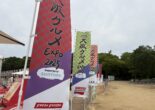
Local Japan: The Best Mistake Ever – Living in the Forest on Mount Fuji
It all started with an abandoned dog, who needed a place to live, and a real estate agent, who couldn’t read a map. That’s how I came to live where I live in Japan
I used to live in a typical small Japanese apartment in a very average Japanese town; and now I’m living one thousand meters up the side of Mount Fuji, deep in the forest, in a delightful little cottage in the resort area called Jurigi.
十里木
The name “Jurigi” roughly means “The Ten Mile Trees,” or “the forest which is ten miles from everywhere else.” The area got this name because it is about the same distance, ten “ri” or so (one “ri” is about 3.9km), from each of the three closest urban areas: Gotemba, Susono, and Fuji City.
Originally, I had no interest in living in Jurigi. People down in the valley towns, where I used to live, think of Jurigi as just forest and hill country, a few cottages, and the Fuji Safari Park zoo. The kind of empty place you might go to for a day or two during the summer holidays, but not the kind of place you go to to live. That’s the image of Jurigi, and that was my image of it, too: lost in endless forests.
But then someone abandoned a puppy at my father-in-law’s farm. I rescued the puppy. The puppy got bigger…..and bigger. He turned into a full grown hunting dog, a Hokkaido Inu
He couldn’t stay in my little apartment in the crowded downtown of Gotemba, which was no place to have the long, long walks a big hunting dog needs. So we asked a local real estate agent about countryside places close to Gotemba. She mentioned that a place had just come up for sale in Suyama, a small farming town up the side of Mount Fuji, between Gotemba and Jurigi.
“But it’s not Jurigi, right?” we asked. (I’m from the big city, Toronto, Canada, and the idea of living in the forest had no real appeal for me.)
“No, it’s not,” she replied confidently. “The address is listed as Suyama. Nice little farming town. You’ll love it; and perfect for your dog.”
She was right about Suyama: it is a nice little farming town. She was wrong about the property for sale: it was in Jurigi. Jurigi is included in the Suyama postal district, so the address was Suyama, but it was miles from the little farming town.
“I made a mistake,” she confessed after we drove around lost for a while and then finally found the property. “It’s not on the map where I thought it was.”
So there we were looking at a cottage in Jurigi, where we had thought that we didn’t want to be, and what did we find? We found tree-lined lanes, attractive cottages surrounded by forest; we found fresh air and quiet, and we found a great place to walk a big, energetic dog.
When you are about to put your life savings into buying a house, it’s natural to worry and to ask yourself over and over: “Is this the right place for me?” “Can I live here?” “Can I settle here?” “Am I making a big mistake?” And, as a big city boy, I was very concerned about what it would really be like to live so far outside of “civilization.”
But my wife liked the little two-bedroom cottage we found, with its overgrown, rocky (but big) garden that was still half forest; and I knew that the dog would like it, too, so we bought it. Then we started fixing it up, a process which still continues today; and we started clearing the garden, another process that still continues today.
So it’s been a lot of work, but we now have a life so very different from our previous life in the city, and we love it.
But I won’t hide the down sides. For example, we are totally car dependent. There is no convenient public transport. There is a twice-a-day bus into town, but it’s not cheap. You can use it for a day-long shopping trip, but not for commuting to work.
And, not only do you need a car, but you need a car that can handle snow-covered and rain-washed mountain roads. I can’t tell you how many times I have seen a big front-engine/rear-wheel-drive sedan or other luxury car gone off the road and into the ditch on the winter roads up here. It’s best to have a light, front-wheel-drive car or a 4WD; and good snow tires in winter are a must. No compromises.
Another difficulty of living up here is that there are no shops. We are not really a town, so there is no town center, no shopping area at all. But we have gotten used to it. We plan our shopping trips into town and always use a shopping list so as not to forget anything.
And there is no doctor here, although there is a small clinic in little Suyama.
But there are no traffic lights here, either, although there is one down in little Suyama, so, if ever you feel like you miss “civilization,” you can drive the six kilometers into Suyama and go look at the traffic light. It’s got red, green, and yellow; everything you want in a traffic light.
We also have wild deer walking around all over the place. They can be a hazard if you don’t keep an eye out while driving, and they are definitely a hazard to the garden when they eat the tulips and lilies.
Now, because the forests of Jurigi join directly to the larger forests on Mount Fuji and Mount Ashitaka, we’ve got the delightful chance of meeting a bear if we go out for a night walk. I’ve bumped into bears twice myself just one street over from where I live. They are generally unsociable folks and it is best to respect their privacy. All joking aside, Japanese black bears can be quite dangerous and must be treated with extreme caution. Do what I did: back away slowly and leave them in peace. That said, I am not aware of anyone in Jurigi ever being attacked by a bear.
But we have bird song in the morning and the rich perfume of trees and soil in the evenings, and those are no hazards at all. And being one thousand meters above sea level, we’ve got bright shining stars at night.
So living in Jurigi is living in the heart of the nature of Japan. Japan, you see, is mostly mountain forest. Many people have the image that Japan is one big urban industrial complex: crowded streets, cramped apartments, capsule hotels, and packed subway trains. But, outside the cities, away from the towns, out beyond the farming districts, there is this huge other Japan: the Japan of nature, the Japan of mountain and forest, the Japan of “yama,” the Japanese word that technically means “mountain” but is also used by people here to refer to the wild back country as a whole.
So I live in “yama.”
山
My Japan is the Japan of hills and forests; the Japan of Jurigi.
And yet, it’s not all that inconvenient because Jurigi is actually not that far from the city in terms of driving time. I can be in downtown Fuji City (pop. 250,000) in less than half an hour. Almost everything I need from a city is there: Libraries, supermarkets, hospital, culture center, and all that.
And, let’s be honest, for a big city boy like me, a thirty minute drive is nothing much. When I was living in downtown Toronto a thirty minute drive got you to…..well…..Toronto, the traffic was so bad and the city so big.
Now with Jurigi being, in fact, a tourist area, it’s not at all “uncivilized.” We’ve got a number of small hotels and pensions, which fill up during the holiday season but are fairly quiet and easy to book at other times, and we’ve got a restaurant serving that classic Japanese countryside dish: Soba (buckwheat noodles). We even have tennis courts!
No, not uncivilized at all.
And the hiking trails on Mount Ashitaka in this area are excellent. The one that starts at the Jurigi Plateau trailhead
gives beautiful views of the surrounding countryside and of spectacular Mount Fuji as you climb higher and higher. Another, which starts at the Yama Jinja trailhead, is a challenging hill and forest course and I don’t recommend trying that trail alone. Best to go with a partner.
So, because there is little public transport up here you’ll need a car to get around, but most of your sightseeing will be done on foot: forest trails and hiking courses, cottage lanes and general wandering. We even have large groups (20-30 people) of daywalkers that come up just to walk around the Jurigi resort area itself to enjoy the tree-lined lanes, to breath in the cool air (much cooler than down in the valley or in the city), and to see the deer.
I’ve been here for five years now and I can certainly say that living in the forest is quite different from living in a big North American city. Yes, I had “everything” when I lived in Toronto; the whole big city life. But I always wanted to “get out,” to “escape.” Now, although it was because of a “mistake” that I first came to live here, living in Jurigi, in the forest, among the trees, the animals, the rocks, the open skies….you could not pay me to live anywhere else.
And while I can’t show you much of a town center in the place where I live, I can show you this, which is just a short walk from my front door.
Written by Dave Price



